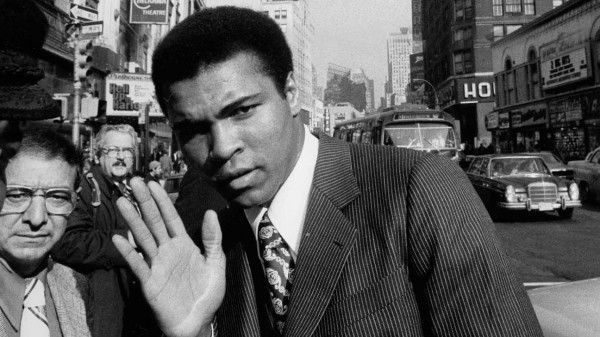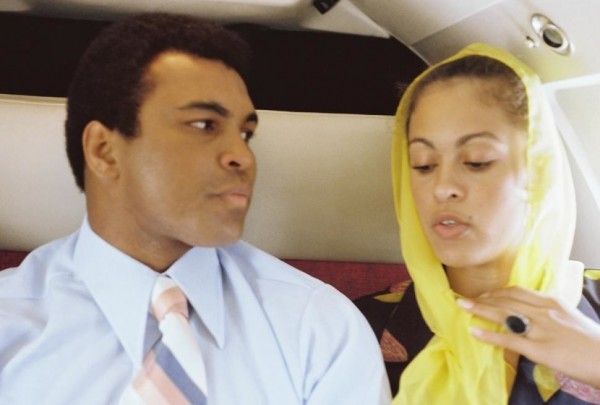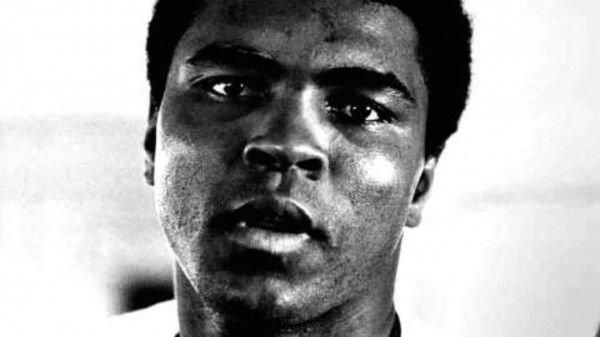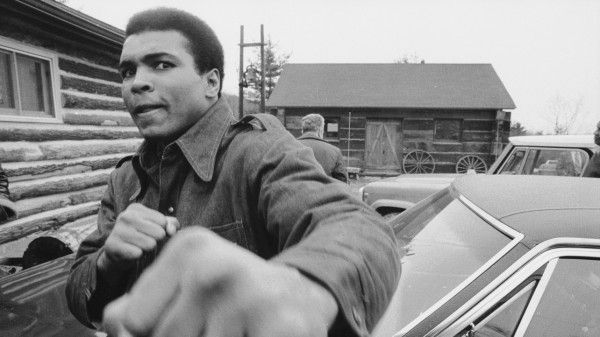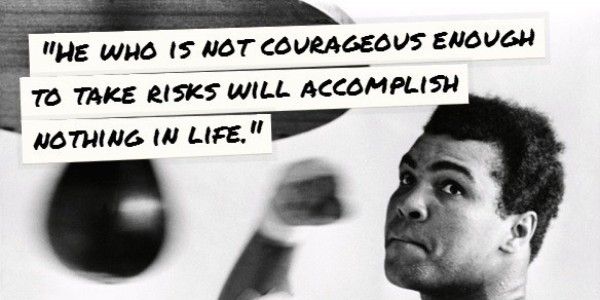In her new documentary, I Am Ali, director Clare Lewins gets to the heart of what makes boxing legend Muhammad Ali so special and reveals a very personal side of the man, not just as a fighter, but as a father, husband, brother, friend, and someone who stood up for what he believed in. Ali lends his charismatic voice to his own story through audio recordings he made of his family and friends which have never been heard outside the family. Along with present day interviews, archival footage, and previously unseen family photographs, they provide the narrative spine of this very unique film now playing in limited release.
In an exclusive interview, Lewins talked about how she first gained access to Muhammad Ali’s family, friends, and the inner circle of the boxing world with the help of his former business manager Gene Kilroy, the special bond she developed with Ali’s daughters Hana and May May, her surprise at discovering the audio tapes Ali had made of conversations with his family in the 70’s and 80’s, the deliberate decision to begin the film with Ali’s last fight, how the movie affirms Ali’s love for his family and his positive outlook on life, the financing for the project, Barbara Broccoli’s involvement, and what’s next. Hit the jump to read the interview.
Can you talk about how this project first came together for you? How did you obtain the cooperation of Muhammad Ali’s family, his inner circle of friends and legends of the boxing community?
CLARE LEWINS: I made a television program for the BBC about Muhammad Ali quite a few years ago, and my main contributor to that film was Gene Kilroy, his former business manager. He’s kept in touch with me ever since. To get into the inner circle of the boxing world [is difficult] because it’s a very closed world. Once I was accepted by them, Gene kept saying, “You’re one of us now,” which is funny because I know nothing about boxing. I’m an English woman and everything. And so, when Ali was 70, Gene said that he was going to be at the center of Ali’s birthday preparations, and as his friend, would I like to go over and film the party? I said, “Well I could do it, but I’d like to make a really good film about him just to find out why he’s so special.” Gene had said to me before, “You see all these documentaries on Ali and the people in them are talking about him and they weren’t even there.” I said, “Okay. With your help then, we’ll do this.” Gene set about putting me in touch with the inner circle, people like Jim Brown. I’d already interviewed Angelo Dundee for the BBC, so I’d already met him. (Dundee was an American boxing trainer who trained Muhammad Ali).
It was through Gene, of course, that I met Hana (Hana Ali, daughter of Ali and Veronice Porche) and May May (Maryum Ali, Ali’s eldest daughter from his marriage to Belinda) in Las Vegas. My producer showed them a little snippet of what I’d been working on. It was a trailer for the film. I mean, it’s not the current trailer but it’s the one I made originally, and I was so mortified. I thought, “Oh my God, he’s showing this to Ali’s daughters.” But they loved it and they said, “There’s something that’s making the hairs on our arms stand up and there’s something about your trailer which makes us feel that you have an emotional side to the way you’re going to tell the story. Most people film us in a hotel room or something.” But I said, “No, I’d want you walking on the beach. It’s a different thing.” Hana phoned me the next day because it was her father’s birthday. She rang my hotel room and said, “I’ve made a home movie for my dad. Would you mind having a look at it? I’d really be interested to see what you think of it.” It was a massive honor for me. She brought the DVD down. When I looked at it, it was just like any daughter who’s made a home movie. It was very charming but a bit rough around the edges. I could hear this audio and she’d put it over photographs, and I thought, “That’s not just archive. There’s something else going on there.” And that’s when I found out she had the tapes.
After that, I spent about a year trying to persuade her to let me use some of these tapes which her father had made in the late 70’s and early 80’s. She was writing a book so she was very protective of the tapes, because she wanted to have exclusivity for her book. But also, she was protective of her father and didn’t want them falling into the wrong hands. It took a while. Then, as she said in an interview earlier, “I don’t think I would have given them to anyone but her.” That was really nice.
So, [I gained access and cooperation] through Gene Kilroy initially, but then of course he can only do so much. He opened the door and then I had to take the baton on. For someone like Jim Brown, Gene vouched for me because he’s not going to want to just talk to anybody. It was the same with Mike Tyson. But with the family, we just immediately [connected]. I feel they’ve taken me on as sort of the white aunt they never had or something because I really feel close to them. Hana trusted me to be true to her father and not do anything bad with those tapes. It’s paid off because I was never going to do that. So, she was right to trust me.
Did you have an opportunity to talk to Muhammad Ali?
LEWINS: Not really. When it was his birthday party, he was surrounded by people, so I can’t say I met him. I was introduced to him briefly. And then, at Hana’s wedding last year in November, that was a much more personal event because there were only 150 people there and I was introduced to her father. She said to Lonnie (Muhammad Ali’s current wife), “This is my friend Clare who’s making a film about Daddy.” But it wasn’t a time to start talking. But he knows I didn’t want it to be with him. It was a deliberate decision, because I wanted people to stand up and say, “This is my experience with Muhammad Ali. This is what I learned. This is what I felt about him.” And then, the tape recordings are his voice. The tape recording is him in the film with this strong voice. You feel his presence in the film because he opens it up saying, “This is Muhammad Ali on November 19th.” And he ends the film saying, “If anybody wonders why I’m making these tapes, it’s because life is so beautiful.” I found it really moving when he says that, which makes you think, “Wow, he just loves life so much.”
Was there a reason why you chose not to include a few moments from his life now? I mean, he’s still alive, and his spirit and his courage remain intact.
LEWINS: Yes, he does know what’s going on. But there have been so many films about him and it was never going to be a soup to nuts film. I had to put a timeline to it. So, what I did was I used the audio clip where he’s saying, “I’m thinking of going back. I think I’m getting another deal.” And his daughter May May says, “No, don’t go back, Daddy. You’re too old.” And then he says, “I’m just messing with you. I’m not going back.” And then, he goes back. So, I started the film with his last fight in 1981 and it was how he got to that last fight, and that was my definite timeline. It was a deliberate decision, because otherwise it would just drift on. Of course, there are huge things I haven’t talked about -- his humanitarian work, how he tried to get the hostages out of Iran, and all these different things. I didn’t even cover that, because I had enough on my hands just doing that. That’s why.
I noticed in the end credits there was an acknowledgement to Barbara Broccoli. How was she involved? What was her contribution to the film?
LEWINS: My thing is I love music. Music I just adore. My editor, who is amazing, mostly edits music videos and people like Kings of Leon and Beyonce. So, we have this great understanding. There was a relevance to why I mentioned Barbara. I thought, “Oh, I’m going to ask Thomas Newman to write the score for this film.” And the executive producer I was working with from Passion Pictures, John Battsek, said, “You might be punching above your weight here because he’s an Oscar winner. Why don’t you just make the film and see if it’s any good before asking.” I said, “No, no, no. That’s not how composers work. You really need to give them some time.” He thought I was just a bit delusional. Anyway, when I made the film and he liked the film, I said, “Look, I still want to speak to Thomas Newman,” and he said, “We have to get a contact. My friend, Barbara Broccoli, knows him.” What she did was she forwarded on his personal details, and I had to write an email to him saying, “Dear Mr. Newman, your music is just amazing, and more than any other American composer, you sum up the American psyche more than anyone I know. And Muhammad Ali is the biggest figure in American [sports] history in the 20th century, so you working together would be a marriage made in heaven.” And he wrote back saying, “I’d love to, but I’m working on Disney. But what I will do is, if you want to use any of my tracks, I will speak to the publisher and reduce the rates.” And this is what he did. So, we put in a credit to Barbara Broccoli because she helped me get that.
I enjoyed how you used Muhammad Ali’s audio journals, the archival footage and interviews to reveal different aspects of the man and his story. What impressed you the most? What did you learn about him that maybe you weren’t aware of?
LEWINS: On the audio sets, I was listening to them late at night because of the time difference. Hana would send over some that she’d written on and she’d never say what was on them. It would just say “Daddy’s tape.” So, at 3 o’clock in the morning, I’d be listening to something. It could be anything on that tape. I very quickly got attuned to his voice. When people say, “Oh it’s not very clear what he’s saying,” I’d say, “What on earth do you mean?” My editor and I, we were like dogs. We could hear every single nuance. I could work out when he was tired, when he was slightly vulnerable, when he was happy, when he was jocular. What I thought I was privileged to hear, because obviously I listened to much more tapes than in the film, was just how much love he has for his family. I mean, it’s in his voice the way he says, “I love my Daddy.” And she says, “I love my poopoo head.” And he says, “No, no, no,” because he doesn’t want that on the tape. I just thought that he has so much love. That’s what I learned about him.
The other thing I learned about him, which keeps hitting me again and again, was his stand against Vietnam. If you look at the archive, it’s an incredibly brave stance he has taken, because a white man saying he’s not going into the draft is one thing, but a black man at that time is amazing.
Another thing I learned about him was how incredibly articulate he is. There’s the bit when the guy asks him, “Why have you changed your name?” and he says, “Oh you know, you’ve all got your names. The Africans have got their names. The Italians have got their names. The Russians…” I used a snippet of that because we were trying to keep the film down, but he goes on for hours about all the Chinese and he goes through different things. And then, he says, “But we’ve got names like Washington or whatever. Those are slave names.” I was thinking what an incredible brain he’s got actually, not only articulating it, but remembering it all. I was very impressed with him. And he’s sexy. He’s a gorgeous looking man. He just knows he’s got it, doesn’t he? I loved Gene’s comment about how he never went past a mirror he didn’t like and look into.
What was the hardest part of making this film? What did you find the most challenging?
LEWINS: A lot of people say the hardest part was making it different, but that wasn’t difficult to me. I didn’t even think about it, which was probably a bit naïve of me. I just went into it and figured I’d make my own film. I wasn’t thinking about what people expected. The hardest part was getting the money to finance the film to start with and then licensing the archive and the music. It was very boring stuff. I’d wanted that Jimi Hendrix track, “Driving South,” for years. I envisioned that Cadillac coming out of the desert. And then, not only did it cost a lot of money, but it took ages to license. I was also being diverish and saying, “I’ll take my name off of my car and have it,” and all that stuff. But it was boring stuff. Actually, it was boring to me, which I found stressful. It was the legal stuff, licensing the music, licensing the archive, and financing it, because the boxing archive costs a lot of money.
How did the financing come together for this project?
LEWINS: I originally went to the BBC. They loved the idea when I described it and said, “No, no, no. This isn’t a TV thing. We know what you’ve got here, but we can’t afford this. So it will have to be a co-production because we can’t afford the archive. So you have to put your money where your mouth is.” Initially, I borrowed some money from a friend of mine who I keep forgetting to thank. I know him very well, and every time I do a friends and family screening, he’s the one person I forget to introduce and to thank. I paid him back obviously. So, I borrowed some money and went off to Vegas and Gene put me in touch with people like Mike Tyson. I wanted to show financiers, whoever they were going to be, that I had the contacts, because it’s all very well somebody coming up, like an English woman saying, “I know all these people,” but I could show them I had Mike Tyson. I had Buzz Aldrin. I had Sir Tom Jones. I had May May. I had three boxers: Ken Norton… I had it all on this tape and they were very good interviews. And so, then I went to Universal and they just saw something in the trailer that I had made. It’s like May May and Hana had. They thought this could be quite special. So then, they financed me.
Has Muhammad Ali had an opportunity to see the film?
LEWINS: No. Before this film goes live, Universal has a policy of not releasing any DVDs. I hadn’t really thought about it but it’s modern technology. So they gave Hana a special DVD to show to Mohammad and he was away in Michigan. So she’s going to go down and see him when he’s back. He’s looking forward to seeing it. He can’t wait for the film to come out. And he said he’s going to love it. Obviously, I don’t know because he hasn’t watched it, but I imagine he would love it.
What was the most personally rewarding aspect of making this film?
LEWINS: The thing I’ve liked about it most is meeting people like Hana and May May because I have a proper genuine relationship with them now. May May was saying, “If you lived in L.A., we’d hang out with you all the time.” I mean, it’s genuine. It’s just so sweet. That is a real privilege to have met them and also I liked working with Gene Kilroy. It’s been very exciting in a way just to get into that life, to go up and see George Foreman and just hear people talk about a time that was quite unusual. Those days of the 60s and 70s boxing were very different from what they are now. It was a more glamorous world, a more protective world maybe. And also, just talking to people like Jim Brown who said, “If you saw the police put dogs up on your children, as a black man you could either acquiesce and slide on by or stand up for what you believe in.” It’s made me now want to stand up for things more. I was always quite principled, but now I’ve gone over the top. I feel it’s made me want to be a better person.
What are you working on next?
LEWINS: I’ve turned down eight jobs, because for me I put so much of myself into something. I’ve never been a jobbing director. I have to be passionate about it. And you’re kind of wiping off two years of your social life. And so, I think for the next project I have to think carefully about what I’m going to do. It may be for me some very normal person who’s had an extraordinary event, or it may be a fisherman or something. Or, if I’m going to do another biography, it has to be on the same level as him. It can’t be somebody who doesn’t interest me. The BBC wants me to do something. I’ve got three people wanting me to do something, and they’re all quite interesting projects. It’s just a question of which one.

